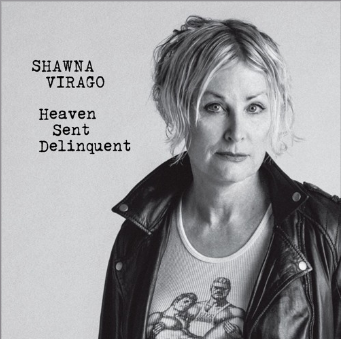
2020 has been unpredictable, to say the very least. Shawna Virago’s ‘Heaven Sent Delinquent’ bares a stark message of hope for these burdened times, and her new electric mix ups the octane some. A critique of the oppressive and proud, it’s an evergreen track that feels as relevant today as ever. For Virago, a trans artist, it’s as apropos as it was when she first began to come up in the early 90s punk scene.
Virago’s answers to our ongoing ‘FFS 5’ interview series offer a window into her view of success in the face of adversity, often against the odds that figureheads of the very industry that she performs within have set against her. Her countenance is painted as harrowing and hopeful, perseverant, and always genuine.
Please tell us a bit about yourself. Where are you from and how did you get started in music? Any defining moments along the path to present day?
I’ve lived in San Francisco for nearly thirty years and grew up in several places around the country, on the West Coast and Southeastern U.S. I’ve loved music from day one. I started playing guitar in the late 70’s, right before the punk explosion. Then I heard bands such as the Clash and X, bands that were considered dangerous at the time, and that fueled me to pursue my own music. I think those bands gave me permission, maybe a little courage to really explore music, to enlarge my curiosity.
So much music, too much really to list, but a sampler would include: No Wave jazz, Old timey music, George Bresson, Jacques Prevert, Jacques Brel, Nina Simone, New York Dolls, Motown, 1970s soul music, Julie London, Jim Reeves, Screaming Jay Jawkins, French Ya Ya music, punkabilly, most songwriters named Charlie: Pride, Daniels, Rich, Ives…the list goes on. Because I consider myself both a songwriter and prose writer, literature has played an equally important part for me: Genet, Modiano, Auster, James Baldwin, Renata Adler, Nikki Giovanni…so many great writers. All these people, these mentors taught me to show up for my work, regardless of my mood and regardless how it might be received.
As an artist, how do you define success?
As a transgender person who came out quite a while ago, the odds have been against me, so I’ve had to create my own world, which is very self-contained, and very protected. I have to win people over literally every time I walk out on stage. This has influenced me to look at art as a form of resistance, like outposts for the sacred. I’ve had this stance for a long time and it’s helped me to walk down my own street, to only write the songs I want, and make the recordings I want. Don’t get me wrong, I am grateful when my songs find audiences who appreciate them, and I want to connect with people and appreciate when I do.
What do you find your greatest struggle to be when it comes to the music business?
As a non-commercial artist, I feel very lucky to be able to record and release the music I want on my own. The mainstream music industry has never held any allure for me. It is in a position of being a gatekeeper, often preventing certain types of artists from participating. To make a profit it focuses more often than not on ‘comfort music’. I understand the mainstream industry has to make money to survive, but I’ve been playing music as an out transgender person for nearly 30 years and honestly, there hasn’t been a place for me in the music business. I’ve been fortunate to self-produce and release my music on my own timeline and look at my music career as a steady-state economy: as long I can keep costs low in the studio and can recoup this through sales, I can keep putting music out. Nonetheless, I feel very lucky to be able to do this and I appreciate that I have managed to carve out some alternative music space for myself.
What do you think is the most realistic goal you can achieve as an artist and as a band? What do you hope to achieve?
From the time I started writing to this day, my goal has been the same: to write songs that resonate with me. I try to go all the way in my creative endeavors and by doing this I’ve found it helps me connect with other like-minded oddballs. Writing songs is a mysterious process, you can’t really describe it with any satisfaction to someone else. Every songwriter’s process is different, unlike say surgeons, who all use the same approach to remove an appendix. But there are aesthetic parameters I hope to hit, that tell me I’m in my zone: melodies that aren’t too sweet, a formalist approach to lyrics. When I hit the mark I’m filled with gratitude, especially since I’m not a prolific writer and the process is slow.
Getting to tour more in small rooms across the country and landing on more playlists would be also nice.
Outside of music, what do you like to do that you feel contributes to the creativity that you tap into for your music?
I watch a lot of what can be called outsider cinema to fuel my creativity when I need a boost. The frame is a little shaky from the hand-held camera, but this helps focus on what’s important in the scene, the grim ironies of life’s grim ironies and desires. This helps me with my songs and also my prose writing.
Words by: Jonathan Frahm
